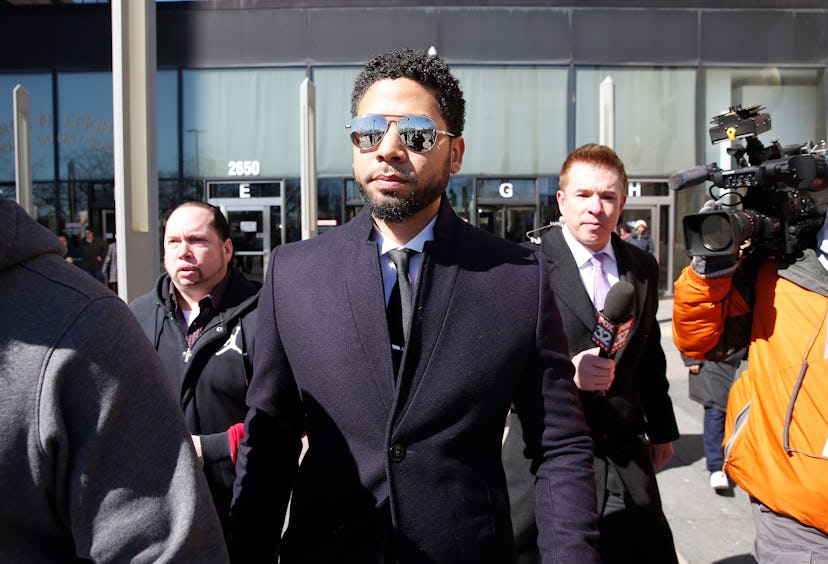What the Jussie Smollett Decision Actually Means

Earlier today, the Cook County state’s attorney’s office announced that it was dropping all charges against Jussie Smollett and that the case records will be sealed. Smollett will forfeit his $10,000 bond, but the charges will be wiped from his record. Despite the assumptions you may have seen people jump to on social media, all we can really take away from the announcement is that, well, Smollett’s charges have been dropped and expunged, and the court records sealed.
The case has proved to be a source of controversy ever since the gossip blog That Grape Juice first reported that Smollett claimed to have been attacked outside of a Chicago hotel on a cold January night by two men wearing ski masks who yelled racist and homophobic slurs at the actor, who is black and openly gay, while also shouting, “This Is MAGA country.” There was an initial showing of public support for Smollett and outrage at the attack, but after weeks of investigation police began to believe that Smollett had orchestrated the attack himself. On February 20, Smollett was charged with four felonies related to filing a false police report, and on March 8 a grand jury indicted Smollett on a total of 16 charges.
Today’s announcement won’t do anything to dampen the controversy and public uproar. Fueling the situation is the fact that, in a Rashomon-like manner, different parties involved in the case and investigation have come to very different conclusions as to what the state’s attorney’s office decision means.
For their part, Smollett and his camp have painted it as a total vindication.
“I’ve been truthful and consistent on every single level since day one,” Smollett said in a statement.
“He was a victim who was vilified and made to appear as a perpetrator as a result of false and inappropriate remarks made to the public causing an inappropriate rush to judgement,” his attorneys Tina Glandian and Patricia Brown Holmes said in their own statement, going a step further.
The Chicago police superintendent Eddie Johnson, however, stands behind his department’s actions.
“Do I think justice was served? No,” Johnson said, adding, “At the end of the day, Mr. Smollett committed this hoax.” It’s clear from his comment that Johnson has no intention of reopening the case or exploring it again from any other angle.
The outgoing Chicago mayor Rahm Emmanuel joined Johnson at the press conference and was even more fiery in his reaction. He called the decision a “whitewashing of justice” and attempted to draw comparisons between Smollett and the celebrity parents recently indicted in the college admission scandal.
Meanwhile, prosecutors are playing down both takes.
The first assistant state’s attorney Joseph Magats (who has handled the case since the elected state’s attorney Kim Fox recused herself) told local media, according to Bloomberg, that he still believes Smollett’s police report was false, and added that “this was not an exoneration.”
Ultimately, though, the prosecutor’s office decided that pursuing a high-profile and potentially costly trial wasn’t worth it given the circumstances, and that the office should focus on “violent crime, gun crime and the drivers of violence” instead.
TMZ also reported that prosecutors had already come to the conclusion that they would only seek a fine and community service even if the case did go to court, and since Smollett has forfeited his bond and already done community service in Chicago, they didn’t really see a point.
Indeed, from a certain perspective, the office’s decision isn’t especially surprising. Prosecutors drop charges all the time. Their offices do not have unlimited resources, talent, time, and money. This is why prosecutors often try to strike plea deals or funnel defendants into pretrial diversion programs. Though it’s not always true, it’s often said that prosecutors don’t go to trial unless they’re fairly certain they can win in the first place. The cases that make it to trial can say a lot about a lead prosecutor’s values and agenda. (This is also why state and district attorney elections have become increasingly important among progressive activists in recent years.)
In this case, the fact that the situation became so high-profile may have also played a large part in the outcome. Smollett’s attorneys are chastising the Chicago PD for trying to prove Smollett’s guilt in the media before an actual trial, and the department is also investigating why there were so many leaks to the media. Attempting to find an impartial jury for the case would have been a headache in and of itself.
Ultimately, because this was a nonviolent crime, the prosecutor decided a trial just wasn’t worth it; we really can’t take anything more from the decision besides that. The prosecutor’s role is to make decisions about how best to pursuit justice, not to get to the bottom of every public mystery. The fact that court records are now sealed also means we’re unlikely to ever see the full evidence collected by police in the first place.